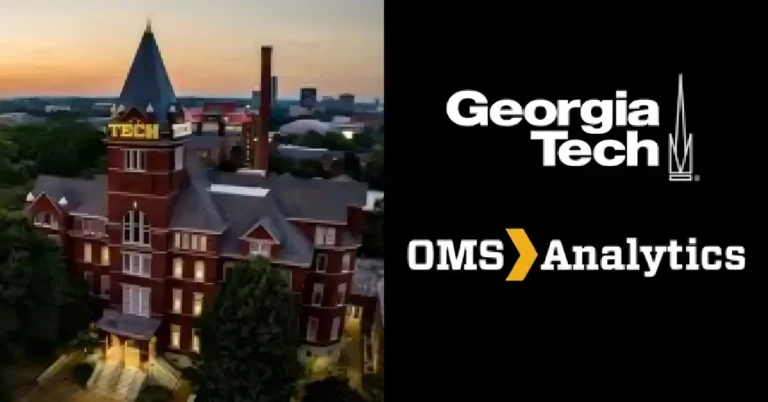If you’re a working professional in data science, analytics, business intelligence, or IT, chances are you’ve considered pursuing a master’s degree. But the challenge is clear: traditional graduate programs are expensive, inflexible, and often require leaving your job or relocating. That’s where the Georgia Tech OMSA (Online Master of Science in Analytics) steps in.
Designed for mid-career professionals, STEM graduates, and international students, the OMSA program combines affordability, flexibility, and world-class academic quality. Whether you want to advance in analytics, pivot into AI, or gain a recognized U.S. graduate degree without breaking the bank, OMSA could be the right fit.
What Is The Georgia Tech OMSA?
The Georgia Tech Online Master of Science in Analytics is a fully online degree launched in partnership with edX. It’s consistently ranked among the best online master’s in analytics, offering the same curriculum as the on-campus program but at a fraction of the cost.
- Total tuition cost: Around $10,000–$11,000 (significantly lower than most analytics master’s programs).
- Completion time: Flexible, from 2 to 3 years, depending on workload.
- Recognition: A degree from Georgia Tech, a top 10 U.S. engineering and technology institution.
(Source: Georgia Tech OMSA Program Overview, Georgia Tech Professional Education)
OMSA Program Requirements
The OMSA admission requirements are designed to balance accessibility with academic rigor:
- Bachelor’s degree (preferably in a STEM field such as computer science, engineering, math, or economics).
- Strong GPA (Georgia Tech recommends a 3.0 GPA or higher).
- Quantitative background (calculus, probability, statistics, and programming skills).
- GRE: Not required.
- Application materials: Resume, statement of purpose, and transcripts.
(Source: Georgia Tech Admissions – OMS Analytics Requirements)
Georgia Tech OMSA Curriculum And Electives Explained
The OMSA curriculum blends technical depth with practical applications. Students can choose from three tracks:
- Analytical Tools – Core courses in statistics, regression, and machine learning.
- Business Analytics – Focused on decision-making, operations, and applied strategy.
- Computational Data Analytics – Emphasis on big data systems, optimization, and advanced modeling.
Sample Courses
- Data and Visual Analytics
- Machine Learning for Analytics
- Business Fundamentals for Analytics
- Big Data for Business Applications
Electives and concentrations let students customize their degree toward their career goals, whether in AI, finance, or advanced data engineering.
Georgia Tech OMSA Tuition Vs Traditional Master’s
One of the biggest reasons OMSA has become so popular is its affordable tuition.
| Program Type | Average Tuition | OMSA Cost | Savings |
| Traditional U.S. Analytics Master’s | $35,000–$70,000 | ~$11,000 | 70–80% cheaper |
| OMSCS (Computer Science at Georgia Tech) | ~$7,000 | ~$11,000 | OMSA slightly higher, still affordable |
For budget-conscious learners, this makes OMSA one of the most affordable online master’s in analytics worldwide.
Is Georgia Tech OMSA Worth It?
Many professionals ask: “Is Georgia Tech OMSA worth it?” The short answer: yes—if you’re looking for flexibility, ROI, and career advancement.
Key Benefits
- Career outcomes: Graduates move into roles like Data Scientist, Machine Learning Engineer, and Analytics Manager.
- Salary growth: Alumni report significant increases, with many exceeding $100,000+ annually in analytics-driven roles.
- Flexibility: Designed for working professionals balancing full-time jobs.
- Global reach: Students join from 90+ countries, making it highly attractive for international learners.
(Source: US News Ranking of Georgia Tech Analytics Programs)
Georgia Tech OMSA Acceptance Rate 2025
The OMSA acceptance rate is typically around 20–25%, making it competitive but more accessible than Georgia Tech’s on-campus programs. With growing demand, the 2025 application cycle is expected to remain selective, especially for applicants without a strong quantitative background.
How Hard Is Georgia Tech online analytics program?
Students describe OMSA as challenging but manageable:
- Coursework is graduate-level rigor, similar to on-campus.
- Expect 10–20 hours per week of study.
- Collaboration with peers is essential, as the program emphasizes real-world projects.
The difficulty depends on your background: STEM graduates may find the transition smoother, while those without programming/statistics experience may need extra preparation.
OMSA Vs OMSCS: Which Is Better?
Both OMSA (Analytics) and OMSCS (Computer Science) are flagship online programs from Georgia Tech.
- OMSA → Best for analytics, business intelligence, and applied data science.
- OMSCS → Best for software engineering, systems, AI research, and advanced CS roles.
Choosing between them depends on whether you want a data/analytics career or a core computer science path.
Final Thoughts
The Georgia Tech online analytics program stands out as one of the best online master’s in analytics in 2025. For working professionals, mid-career changers, STEM graduates, and international students, it offers a rare balance of affordability, flexibility, and prestige.
If you’re ready to advance your career in analytics without sacrificing your job, family, or finances, OMSA is one of the smartest graduate education choices available today.
FAQ’s
Is Georgia Tech OMSA worth it?
Yes. OMSA offers world-class education, flexible scheduling, and career advancement opportunities at a fraction of the cost of traditional programs.
What is the Georgia Tech OMSA acceptance rate in 2025?
The acceptance rate is about 20–25%, competitive but more accessible than on-campus programs.
How much does Georgia Tech OMSA cost compared to a traditional degree?
OMSA costs around $11,000, while traditional analytics master’s programs range between $35,000–$70,000.
Does Georgia Tech OMSA require GRE?
No, GRE is not required for admission.
How long does Georgia Tech OMSA take to complete?
Most students finish in 2–3 years, depending on part-time or full-time pacing.
What are the career outcomes of Georgia Tech OMSA graduates?
Graduates typically move into roles such as Data Scientist, Analytics Manager, or Machine Learning Engineer, with strong salary growth.

